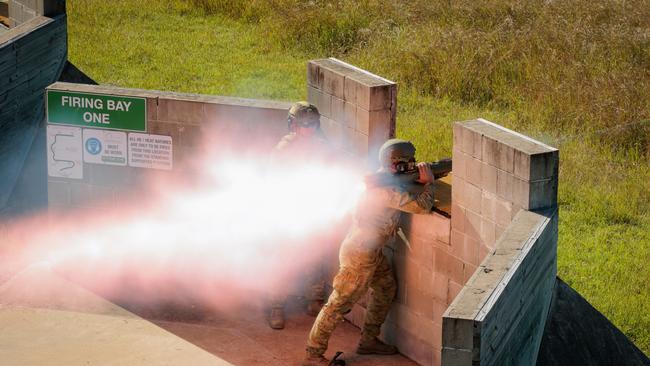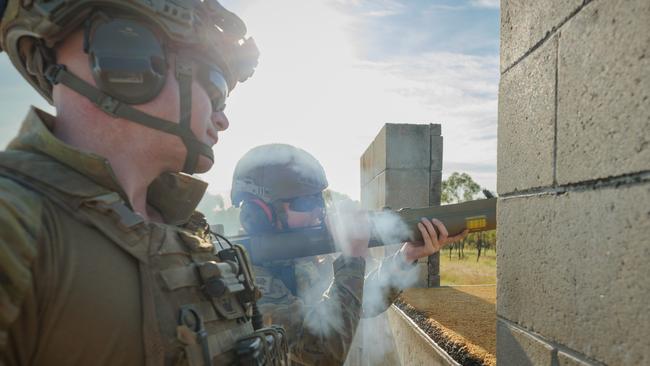Defence Department support for shell-shock cut
The Defence Department axed support for a project to monitor soldiers’ exposure to blast pressure waves that have been linked to brain damage and suicide, as the bureaucracy turned a blind eye to the problem.

The Defence Department axed support for a project to monitor soldiers’ exposure to blast pressure waves that have been linked to brain damage and suicide, as the bureaucracy turned a blind eye to the problem.
Two companies were funded under the now-defunct Defence Innovation Hub to develop an early warning system to protect soldiers from similar brain injuries to those suffered by elite NRL and AFL players.
The companies, GLIA Diagnostics and Invicta Prospect Group, received a combined $1.5m between 2019 and 2022 to develop wearable blast sensors and software to help soldiers and commanders manage an individual’s risk of harm.
But the project was dumped when the innovation hub was folded into the Albanese government’s new Advanced Strategic Capabilities Accelerator.
The failure to progress the system followed the defunding of a longitudinal study on brain injury and PTSD in veterans, and the axing of a 2012 trial of blast-pressure gauges by special forces troops in Afghanistan.
Defence embarked on a fresh pilot project last month to assess blast exposure for an unknown number of personnel, amid lobbying by soldiers and veterans’ groups.
Invicta Prospect Group co-founder Daniel Pace, a former navy clearance diver, said his company received $300,000 from Defence to develop its system, which uses a blast pressure gauge, rapid blood testing and artificial intelligence to monitor troops’ exposure.
“We had about four years of delays. And then the (innovation) hub got shut down,” Mr Pace said.
The company was told by a senior commander in 2022 that the Australian Defence Force would acquire the system only “if you can sell it to the US first”.

Mr Pace said the company had been trying to get Defence to reconsider the technology, receiving “overwhelming support from Special Operations Command and the navy’s Mine Warfare and Clearance Diving Group”.
At a meeting last week, Defence’s science and health branches also backed the need for a blast monitoring solution.
“They are supportive of the direction we are heading, and the need to move forward. But the ADF’s leadership is yet to make a commitment,” Mr Pace said.
Researchers warn the cumulative effects of mild traumatic brain injuries, or mTBI, from explosions in training and combat can lead to potentially fatal brain conditions like those suffered by professional footballers.
Special forces personnel are among those most at risk, along with tank and artillery crews, infantry soldiers, engineers and navy clearance divers.
The lack of interest from Defence came as the US congress ordered the Pentagon in 2019 to document troops’ blast exposure in their medical records.
A bill currently before congress would impose even tougher measures, requiring military personnel to wear blast pressure monitors and undergo regular neurocognitive tests.
Retired major general Fergus McLachlan, a former armoured brigade commander who sits on Invicta Prospect Group’s board of advisers, pointed to findings in the US that army tank crew members were three times more likely to die by suicide than other soldiers.
“I can only think that may well be related to exposure to blast overpressure,” he said.

He said commanders needed the right tools to keep their people safe from harm.
“There is absolutely no reason why you couldn’t use evidence of previous exposure and decision support tools to help prompt a senior leader to say, ‘This person should not be eligible for this type of training for another three months because of repeated exposure’,” Mr McLachlan said.
The Royal Commission into Defence and Veteran Suicide made no mention of the dangers posed by mTBI in its interim report, reflecting the failure of Australian authorities to take the condition seriously.
But it’s understood its final report will recommend further research be undertaken to inform the government of the risks.
Labor MP Luke Gosling and opposition defence spokesman Andrew Hastie - both former special forces soldiers - have thrown their support behind a veteran-led campaign to protect ADF personnel from blast-induced brain injuries.
If you or a family member need help, contact: Suicide Call Back Service 1300 659 467; Lifeline Australia 13 11 14; Open Arms 1800 011 046; Defence All-hours Support Line 1800 628 036




To join the conversation, please log in. Don't have an account? Register
Join the conversation, you are commenting as Logout